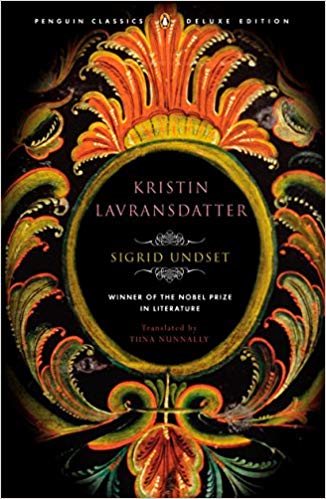I shall never love again”
—Buttercup, The Princess Bride
For this month’s column, I’d like to amend this quote to “I shall never read again.”
To clarify, I will. To be honest, I have. But I will never read fiction in the same way again, now permit me to recline on my fainting couch and moan. For I have finished Sigrid Undset’s Kristin Lavransdatter. And the next day, I started it again. All 1,168 pages (or on Audible, 45 hours).
In Reader, Come Home, Dr. Maryanne Wolf recalls taking a walk in the French Alps with Dr. Aurelio Maria Mottola, a publisher in Italy. They discussed what happens when a culture loses the touchstones books provide. Wolf writes, “What would happen if a culture’s shared repertoire of allusions—metaphors from the Bible, myths, and fables; remembered lines of poems; characters from stories—begins to shrink and gradually disappear?”
Kristin’s story has all of the above. It simultaneously describes a world I can only imagine and characters I’ve known all my life.
I first heard about this book — whose author won the Nobel Prize for Literature in 1928 — a couple of years ago from a friend whose recs never fail me. But I remained skeptical. A book about one woman’s life in 14th-century Norway? Written approximately 100 years ago? How good could it be? But my friend was so moved by the book he had no words. He just groaned in appreciation.
As I grow older and consume more stories, in a variety of forms, it’s harder to surprise me. I anticipate plot twists and character revelations. This book kept surprising me. Which is remarkable because Kristin is an ordinary woman. She is also extraordinary.
Take this short passage from the final chapter:
No one had any other thought but to comply. But when they reached the road, one of the pale gray figures slipped away from the flock of women and headed for the path leading into the woods.”
That has to be Kristin, I thought as I read. Only she would slip away from the gray flock of conformity and head straight into the woods.
The priest calls after her, and “Kristin’s voice replied from the dark.” That’s where her voice always comes from — whether from the darkness of her circumstances, from her own inner darkness, or from a moment when she is rushing straight into darkness to make a difference (as she is in this scene).
There are three chapters I reread — three times each — before beginning my official reread. One is the scene I just mentioned, one is a deathbed scene in which a confession goes awry, and one is the equivalent of Huck Finn’s boast — “All right, then, I’ll go to hell” — but with more action. In that chapter Kristin’s errand brings her in contact with the dead, just like Odysseus.
Because the book is set in the Middle Ages, the worldview is more porous than our own, while being grounded in seasons and meals and births and deaths and journeys. Kristin and her community are Catholic, devotedly so, and yet tales of trolls and elf maidens and children who are changelings are never far away. Those beliefs live right beside devotion to the Virgin Mary and St. Olaf, patron saint of Norway. There is a moment when a group of rowdy, desperate men are planning to make a sacrifice to Hel, which, if you’ve read Norse Mythology or the Magnus Chase series, you know is the daughter of Loki. It’s all there, along with battle axes and swords and flower wreaths and medicines made from herbs gathered by a child in the moonlight for good luck.
But people are people, in every century. They think wicked thoughts while on the way to church. They do horrible things from pure motives. Children have no idea how their choices impact their parents, and parents have no idea what they are getting into with each child they welcome to their family. All of us — we repent. We don’t. We forgive. We don’t. We fall in love and do crazy things. We have no idea who it is who loves us.
I usually journal about books that move me, but not like the pages and pages of fearless moral inventory I scribbled while reading Kristin’s story. Anytime anyone brings up a problem, be it personal, political, or spiritual, I have to keep myself from responding, “Well, in Kristin Lavransdatter …”
This may not be the book for you, the one that causes you to swoon and vow, “I shall never read again.” But have you read that book? Was it one you resisted because you thought it would be too hard, too dull, too long, too inscrutable, too darn heavy?
My friends, I invite you to scrute. Pick the big book.
April Pages
Finished
Poetry
That Spotted Sow and Other Texas Hill Country Ballads, Carlos Ashley, illus. H.D. Bugbee
Nibble, Nibble: Poems for Children, Margaret Wise Brown, illus. Leonard Wisegard
Adult
A Light So Lovely: The Spiritual Legacy of Madeleine L’Engle, Sarah Arthur
All You Can Ever Know: A Memoir, Nicole Chung
Tea and Justice, Becca Stevens
Early Readers and Picture Books
The Snowman, Raymond Briggs (read the original, the one without words)
A Particular Cow, Mem Fox
Chrysanthemum, Kevin Henkes
Middle Grade and YA
Dear Mr. Henshaw, Beverly Cleary (Join us for Children’s Book Club, May 10!)
Made Progress
Kristin Lavransdatter, Sigrid Undset (second time, surely not the last)
Your turn
1. What is the hardest or longest book you’ve read?
2. Have you encountered a book so good it made you vow to never read (or possibly, never write) again?
3. Did you make some time for deep reading this month? What stories stirred your soul?
4. Share your April pages. Sliced, started, and abandoned are all fair game.
Photo by Jonathan Combe, Creative Commons, via Flickr. Post by Megan Willome.
Browse more Reader, Come Home
“Megan Willome’s The Joy of Poetry is not a long book, but it took me longer to read than I expected, because I kept stopping to savor poems and passages, to make note of books mentioned, and to compare Willome’s journey into poetry to my own. The book is many things. An unpretentious, funny, and poignant memoir. A defense of poetry, a response to literature that has touched her life, and a manual on how to write poetry. It’s also the story of a daughter who loses her mother to cancer. The author links these things into a narrative much like that of a novel. I loved this book. As soon as I finished, I began reading it again.”
—David Lee Garrison, author of Playing Bach in the D. C. Metro
- Perspective: The Two, The Only: Calvin and Hobbes - December 16, 2022
- Children’s Book Club: A Very Haunted Christmas - December 9, 2022
- By Heart: ‘The night is darkening round me’ by Emily Brontë - December 2, 2022



Glynn says
1,168 pages. That’s brave.
As to a conversation about what happens when a culture loses its touchstones, my wife and I have it regularly. In a strange way, it’s like reading my local daily newspaper, which continues to shrink (in size and number of pages) as it abandons what made it successful in the first place. Reading it increasingly becomes an exercise in cognitive dissonance.
April reading:
Mystery
Blue-Blooded by Emma Jameson
Deathly Wind by Keith Moray
The Cotswolds Murder by Roy Lewis
Dry Bones by Jay Tepe
Murder Solstice by Keith Moray
Fiction
Changing the Guard by James Farmer
Tender Love by Juliette Duncan
The Garden on Sunset by Martin Turnbull
Going Home by James Shipman
The Rose Blooms Twice by Vikki Kestell
Wild Heart on the Prairie by Vikki Kestell
Trouble the Water by Jacqueline Friedland
Poetry
Umbilical by Michael Spence
Breakwater by Catherine Savage Brosman
In the Old Plaza by Catherine Savage Brosman
A Memory of Manaus by Catherine Savage Brosman
Be With by Forrest Gander
Ragged Anthem by Chris Dombrowski
Non-Fiction
The Crusades by Thomas Asbridge
Living a Life of Yes by David Rupert
Megan Willome says
Glynn, I am fortunate to live in a small town with an independent newspaper. (I am also fortunate to work for them on special projects.) Some of our town’s tension comes from which touchstones to honor, German or Mexican? If both, then how? If neither, then we cede our future to wine tourists.
I did not know David Rupert had a book out. Thanks for the tip.
L.L. Barkat says
Megan, your discussion of Kristin is absolutely inspired. After I read the book (back in 2007), I thought “I will never write again.”
And then it changed the way I wrote.
Undset’s incredible handling of the simple image to speak worlds became my North star of writing. I can only imagine how powerful the book must be in its original language, for those in the culture where many of these images exist/existed.
I’m so fascinated that the book set you to journaling a fearless moral inventory. I wonder… does that feel like it’s going to have lasting effects?
What stirred my soul in April… poetry. Much of it actually from the authors at T.S. Poetry Press, as I went through the 30 Days, 30 Poems Challenge. And, too, my dare poet: Agha Shahid Ali. I will continue to carry forward, “She is still somehow holding the world together: she is naming the roses.”
Megan Willome says
Ooh, I don’t know him. I’ll have to get acquainted!
I love what you said about Undset’s use of “the simple image to speak worlds”–that’s what I’m noticing even more the second time through. And like a good author, she doesn’t call attention to it, just puts it out there and allows room for you to do the deep work.
As to the fearless moral inventory, not only yes but heck yes. I don’t use the word “spiritual” lightly, but this was a deeply spiritual book for me. That’s not a part of my life I write much about in public, but I do in private.
Callie Feyen says
Megan,
Our conversations on Voxer regarding Kristin, and this essay makes me joyous to know there are others in the world who loved this book as much as I. You know the shame I felt in loving it so, and my equal shame in not being brave enough to articulate why I love it. Thank you for leading the way for me in this regard (and in so many other regards – you are quite the mentor, and friend).
-Callie
Megan Willome says
Callie, I was just so thrilled to get to gush about it with someone. I love having a friend who gets into stories as much as I do.
Callie Feyen says
And we have a ridiculous amount of stories in common that we love, don’t we? At this point, if you write about a book I’ve not read, I think, “Well, if Megan likes it, then surely I will too.”
Megan Willome says
Same.
Liza says
Hi Megan, I am curious, which translation did you read of Kristin Lavransdatter?
Megan Willome says
Liza, I am reading—now for the fourth time—Tiina Nunnally’s translation from 2005. The original translation left out several sections, and I don’t want one word removed.
I recently convinced a friend to read it, and we took a book club walk to discuss it. We decided we need another walk, because one hour was not nearly enough.